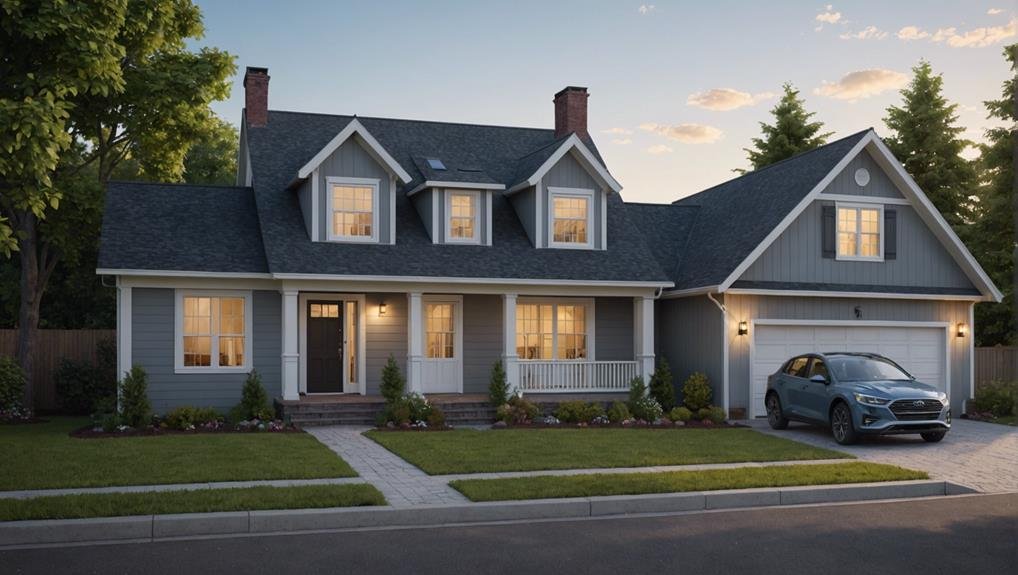FHA 203(k) Loans: Transforming Homes and Lives
FHA 203(k) Loans blend home purchase with renovation, allowing customization and increased property value. They offer financial aid, simplifying access to funds for improvements, fostering homeownership. Applicants partner with eligible lenders, meeting criteria like a credit score of 580 and 3.5% down payment. Types include Limited 203(k) for minor repairs and Standard 203(k) for extensive work. These loans function as a tool for rejuvenating properties, using escrow management for renovation funds. Compared to traditional loans, FHA 203(k) loans typically offer lower rates, flexible eligibility, streamlined processes, and government insurance. Transform homes and lives with FHA 203(k) Loans.
Key Takeaways
- FHA 203(k) loans combine home purchase and renovation costs, revitalizing properties and enhancing living spaces.
- These loans foster homeownership by providing financial assistance for property investments with repair needs.
- They offer a streamlined application process, simplifying access to funds for purchase and renovation stages.
- FHA 203(k) loans transform homes by facilitating customized renovations and increasing property values.
- With lower interest rates, flexible eligibility, and government insurance, they make financing easier for homeowners.
Benefits of FHA 203(k) Loans
FHA 203(k) loans offer a multitude of advantages to prospective homeowners looking to purchase and renovate properties in need of repair. These loans provide essential financial assistance by combining the home purchase and renovation costs into one convenient package, easing the burden on buyers.
The option for home renovation under the FHA 203(k) program allows individuals to customize their new homes to their preferences while increasing the property's value. This financial support enables buyers to invest in properties that may otherwise be out of reach due to repair needs, fostering homeownership and revitalizing communities.
The ability to access funds for both the purchase and renovation stages simplifies the process and encourages individuals to take on homes that require work, ultimately leading to enhanced living spaces and increased property values.
Application Process for FHA 203(k) Loans
When initiating the application process for 203(k) loans, prospective homeowners must carefully gather the necessary documentation and partner with an eligible lender. Eligibility requirements for FHA 203(k) loans are akin to regular FHA loans, including a minimum credit score of 580 and a down payment of 3.5%.
The application process involves finding a bank, credit union, or approved lender to apply for the loan. Applicants need to make certain that the purpose of the loan aligns with FHA 203(k) guidelines, which cover improvements such as structural alterations, modernization, and hazard elimination.
Once the application is submitted, approval is contingent on meeting these eligibility criteria and adhering to the loan terms and conditions.
Types of FHA 203(k) Loans
There are two distinct types of FHA 203(k) loans available to individuals and families seeking to purchase and renovate a home. These options cater to varying renovation needs and eligibility criteria. Below is a comparison table outlining the key differences between the Limited 203(k) and Standard 203(k) loans:
| FHA 203(k) Loan Type | Renovation Options | Eligibility Criteria |
|---|---|---|
| Limited 203(k) | Minimal repairs capped at $35,000 | Individuals and families making the property their primary residence |
| Standard 203(k) | Extensive repairs with no capped cost | Individuals and families making the property their primary residence |
These loans provide flexibility for different renovation scopes while ensuring that applicants meet specific residency requirements.
Working Mechanism of FHA 203(k) Loans
With a focus on thorough home renovation and purchase support, FHA 203(k) loans function as an essential financial tool for prospective homeowners seeking to rejuvenate properties in need of repair.
The working mechanism of FHA 203(k) loans involves efficient escrow management, where renovation funds are held and disbursed as the work progresses. This process guarantees that the allocated funds are used appropriately and in line with the agreed-upon renovation plan.
Additionally, contractor selection is a critical aspect of FHA 203(k) loans, as borrowers must engage licensed professionals to carry out the necessary repairs or renovations.
Comparison With Other Construction Loans
When evaluating the benefits of FHA 203(k) loans versus alternative construction financing options, it becomes clear that the FHA program offers unique advantages for prospective homeowners seeking extensive renovation and purchase solutions.
- Interest Rates: FHA 203(k) loans typically have lower interest rates compared to traditional construction loans.
- Eligibility Requirements: FHA 203(k) loans have more flexible eligibility criteria, making them accessible to a broader range of borrowers.
- Streamlined Process: The FHA 203(k) loan process is often more streamlined and straightforward than other construction loan options.
- Government Backing: FHA 203(k) loans are government-insured, providing lenders with increased security and potentially leading to more favorable terms for borrowers.
- Comprehensive Coverage: FHA 203(k) loans cover both the purchase price and renovation costs in a single mortgage, simplifying the financing process for homeowners.
Conclusion
To sum up, FHA 203(k) loans serve as an essential tool for individuals looking to purchase and renovate properties, especially those from lower-income backgrounds.
One interesting statistic reveals that in 2020, the number of FHA 203(k) loans issued increased by 36%, indicating a growing trend towards utilizing these loans for home improvement projects.
With their unique benefits and tailored variants, FHA 203(k) loans have the potential to transform not just homes, but also lives and communities.







